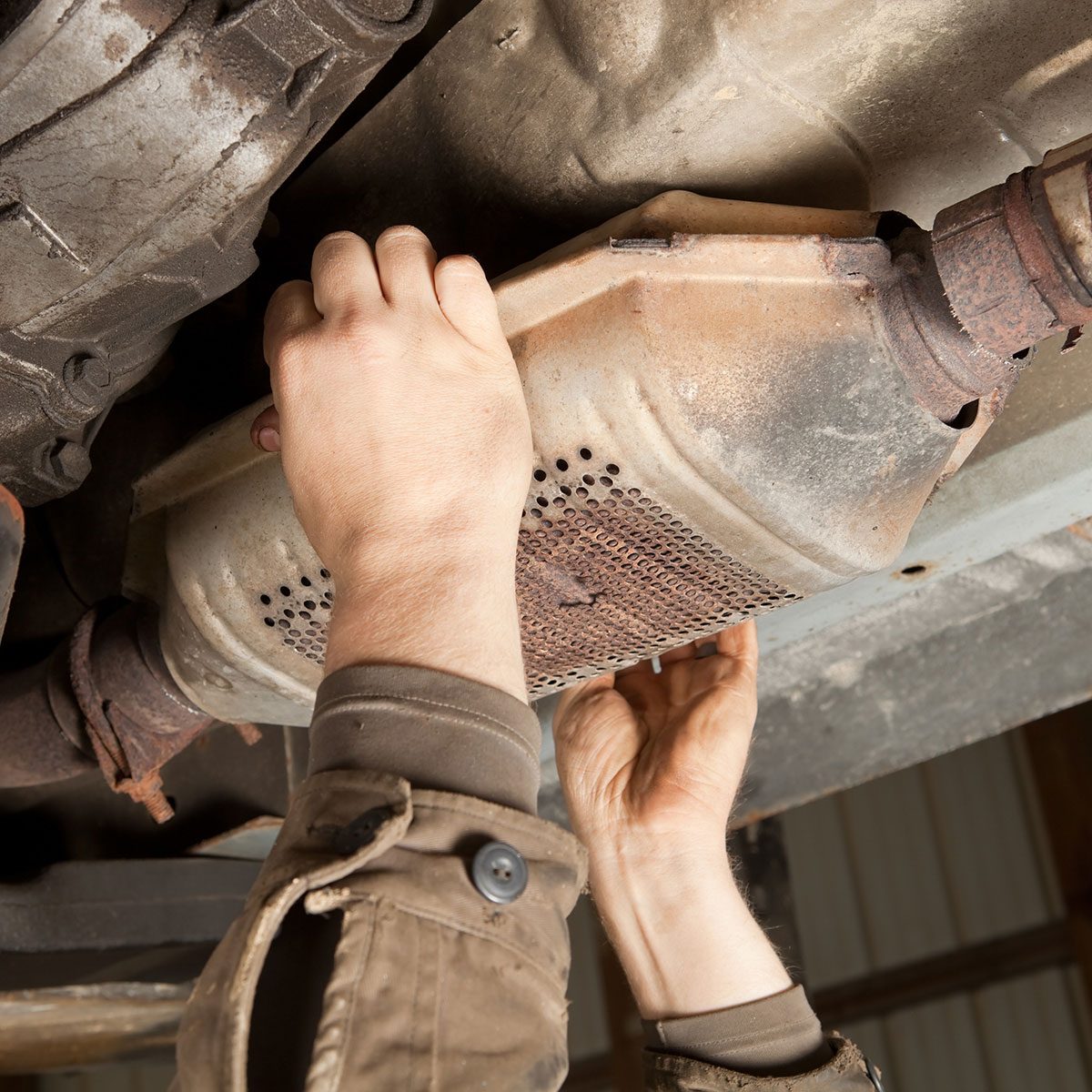Catalytic converters are an increasingly popular target for thieves looking to make a quick chunk of change. Here's what you need to know.

What To Do if Your Catalytic Converter Is Stolen

If you start your car and hear a low, loud rumble, one of the first things you should check is whether your catalytic converter has been stolen.
Catalytic converters are a part of a vehicle’s exhaust system that helps lower emissions and reduce the negative impact automobile traffic has on the environment. They also tend to pop up in the news every late winter and early spring as thefts of these unassuming little devices surge in some areas.
Here’s why catalytic converters are being stolen, what makes them so attractive to car thieves, and what you can do to prevent your vehicles’ from going missing.
On This Page
Why Are Catalytic Converters Being Stolen?
Catalytic converters represent a treasure trove to potential thieves looking to make a quick buck. That’s because they use rare metals like palladium and platinum to filter your emissions and reduce vehicle pollution. Unsurprisingly, those rare metals are worth quite a bit of money. Palladium alone sells for nearly $2,500 an ounce.
But what really makes catalytic converters an appealing target is how easy they are to steal. All a burglar has to do is crawl under a vehicle with a reciprocating saw and slice the converter free from the undercarriage. In most cases, they don’t even need to jack up the car first. Plus, catalytic converters don’t carry any sort of identification number, so it’s pretty much impossible to identify them as stolen property.
Can a Car Run Without a Catalytic Converter?
The good news is, your car will run just fine without a catalytic converter. Because it filters exhaust and emissions, it doesn’t really impact your vehicle’s actual driving capabilities. However, due to environmental protection laws, you could face some hefty fines if you’re caught driving a vehicle without one.
How Much Does a Replacement Cost?
Replacement catalytic converters can cost thousands, depending on the quality of the converter and your vehicle type. You’ll also have to pay for installation, unless you plan on tackling the complicated process yourself.
Fortunately, comprehensive car insurance should cover theft-related problems. If your car was insured, you’ll likely pay little out of pocket to get a new catalytic converter, depending on your deductible.
How to Prevent Catalytic Converter Theft
The best preventive measure you can take is asking your mechanic to use welding techniques to attach the converter more permanently to your undercarriage.
Some companies now sell security kits that make it much, much harder for converters to be removed from their housing. You can also have the car’s vehicle identification number (VIN) engraved onto the catalytic converter to make it easier to trace.
Other methods for theft prevention will help, too. If you can’t park your car in a closed garage, make sure you leave it in a well-lit, highly visible location.
FAQ
Are car thieves still targeting catalytic converters in 2025?
Yes. Because catalytic converters contain precious metals, they are still a target for car thieves, especially on vehicles with high clearance, says Melanie Musson, an auto industry expert with CarInsurance.org. “The higher the clearance, the easier thieves can get under the vehicle and cut the catalytic converter out,” she says.
However, the rate of thefts has fallen thanks to new laws that prevent scrap metal businesses from taking them without proof they are not stolen. “Although states and federal laws and recycling yards are trying to make it much harder, thieves still pass them off as if they were removed from a low-mileage wrecked vehicle,” says Pyle.
What other car parts are targeted by thieves?
Rims, tires, airbags, radios, navigation systems, vehicle doors and side mirrors are common targets, says Kevin Oliff, general manager at AutoNation BMW. To that list, Musson adds batteries, since they’re easy to access and are increasing in value.
“Other common items to steal are spare tires on Jeeps and rear taillights that are LED because they are fast, easy to remove and can fetch a pretty penny online,” says Chris “Moose” Pyle, an automotive expert with JustAnswer. “For example, one rear taillight on a 2020 Ford F150 is $600.”
About the Experts
- Melanie Musson is an auto industry expert with CarInsurance.org, where she has worked for nearly a decade.
- Chris “Moose” Pyle is a master-certified technician with 20-plus years of automotive experience. He has also worked as an expert for JustAnswer, the expert on-demand platform, since 2006.
- Kevin Oliff is general manager at AutoNation BMW in Buena Park, California, and has worked in the auto industry since 2010.




















